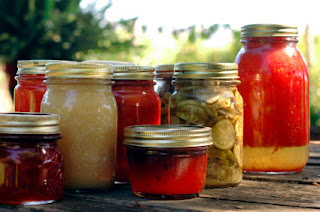I was intrigued when I read the title of Shannon Hayes book, Radical Homemakers: Reclaiming Domesticity from a Consumer Culture
. In a time of downsizing and working with what you have, I thought I could learn a thing or two from some hard core homemakers.
The book turned out differently than I expected. Instead of gaining insight on how to reuse or repurpose household items, I learned about a new way of thinking about the home. The importance of your home is the backbone for each homemaker’s story. There is a collection of twenty stories from both women and men who are trying to live off the land, homeschool their children, and live a simpler lifestyle. Some are doing it on a farm in a quiet New England tow, and others are making do with an urban garden.
The book is divided into two parts. The first explores how we came to be a consumer driven culture. Betty Friedan’s The Feminine Mystique, written in 1963, first explored the challenges of the housewife. Women were becoming bored with shopping trips and household duties, called the “housewife’s syndrome.” It sparked an increase of women in the workforce, which in turn led to our reliance on convenient foods and products. The Radical Homemakers profiled strive to live differently, in a life-serving economy.
“Further, in a life serving economy, we individually accept responsibility for creating our own joys and pleasures. We do not rely upon corporate America to sell us these things.”
I am guilty of relying on my “toys” for entertainment, but hope I can achieve a healthy balance with non-commercial joys like playing with my kids and cooking a great meal. Less stuff can mean more time for family and friends on our lives. Who wouldn’t want to spend less time doing errands and more time playing. As I work to declutter this week during Project Simplicity, I am very aware of the extra stuff in my home. The stories in the book reveal how little in terms of stuff we truly need to sustain ourselves. Everyone seems a lot handier than I ever will be, but I can still work harder to repurpose what I have instead of constantly buying new stuff.
What struck a cord with me in Radical Homemakers is the discussion about the status of eating habits in America. As I try to focus more on eating real food, I found it sad to learn how prevalent packaged food has become in our society. One very grim stat is that the US was once one of the healthiest countries in the world, by 1960s we dropped to the 13th healthiest and now we are 25th. For an education nation, it amazes me that collectively we are still not making better food choices for ourselves. Another sobering statistic, while the US has the cheapest food in the world, we also have the highest health-care costs per capita. The connection between the two cannot be missed. Many of the homemakers in the book discuss a renewed focus on eating as a family, growing your own food, and avoiding the packaged foods that have led to a society with high rates of both diabetes and childhood obesity.
I think if you will enjoy this book if you want to hear an outside the box opinion on schooling, vaccinations and community. It is refreshing to read about friends and family coming together to help raise children as it was done for many years. There are some homemakers that are more “radical” than others, but I appreciated hearing their stories.
Visit Radical Homemakers website to connect with other like minded men and women. There is a forum to share your location to find others in your area who share your passion for production instead of consumption.
I learned about this book from SortaCrunchy‘s book list…anyone else have some great reading suggestions?
Image credit: CountryLiving.com; Life123.com







Thanks for the insights on this book! As you know, I've been wanting to read this for months and months. I think I'm partly afraid that it's one of those that will change my paradigm so drastically that I won't know where to start.
I have heard so many good, powerful things about what and how she covers these topics. I'm glad to hear you liked it! (And I had no idea there was a website. VERY COOL.)